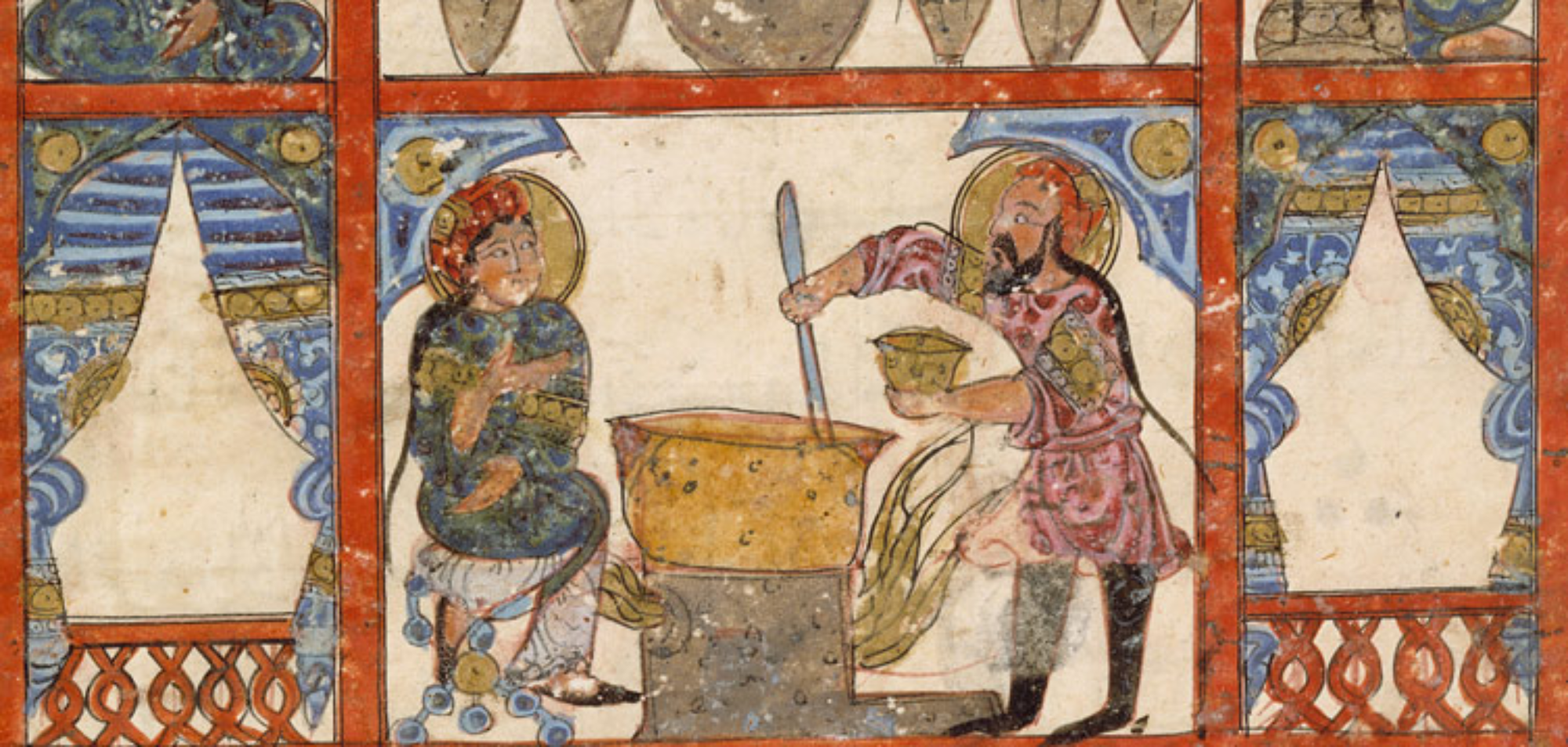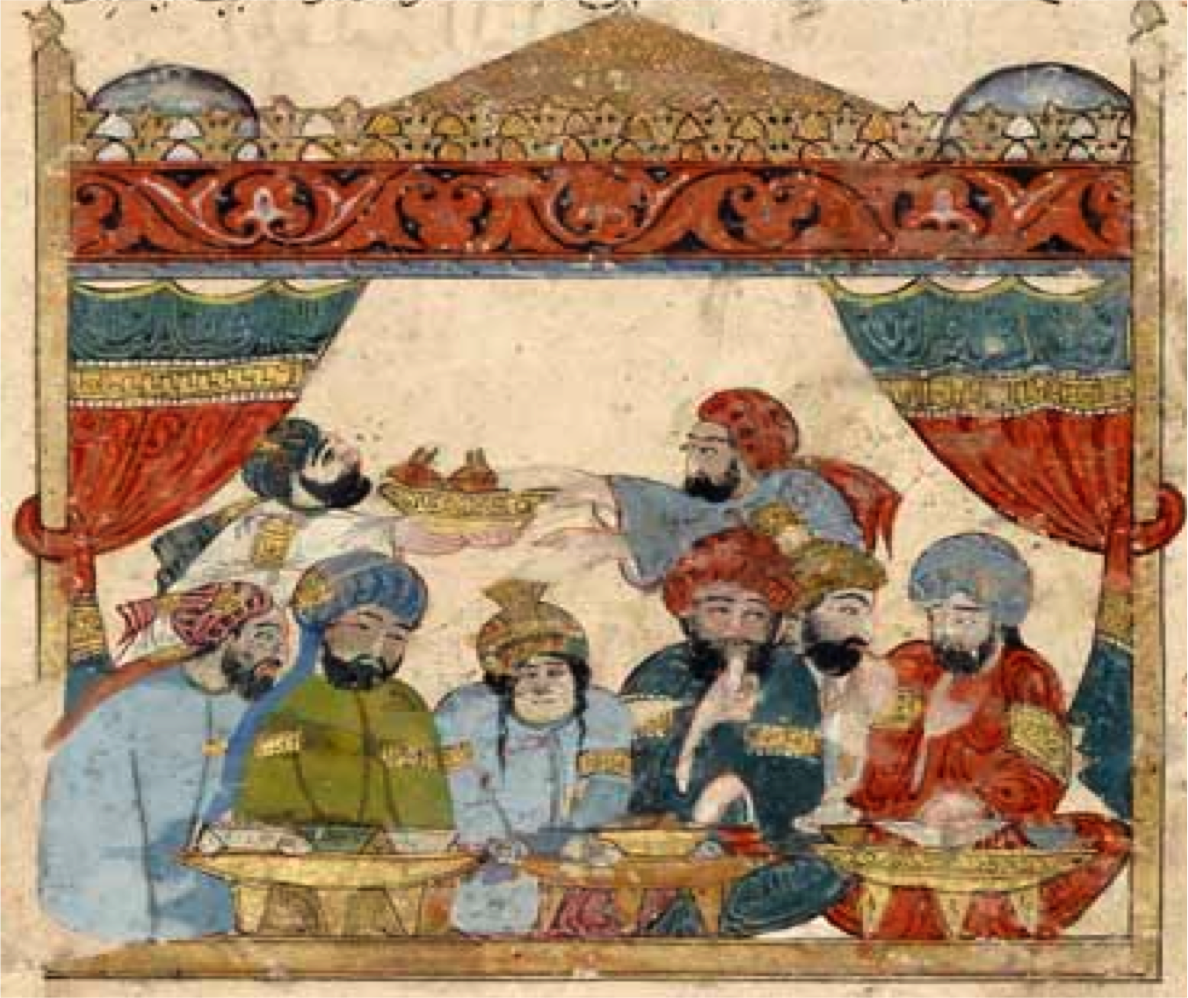Much of the food-related etiquette (ādāb al-akl) is linked to religion, and there are numerous hadiths (sayings by the Prophet) that deal with the subject. These range from not having food for one person, or a plate for one person, to avoiding eating by oneself, and, especially, the need for hospitality, with giving food to guests being considered one of the highest social virtues and traits of a noble character. This went back to the Arabs’ desert past and the need for sustenance in the inhospitable conditions. Those violating the laws of hospitality were mercilessly mocked in literature as far back as pre-Islamic poetry, with the poet al-Akhtal, for instance, berating “ِA people who, when the approaching guests make their dogs bark, say to their mother, ‘Piss on the fire!'” (قوم إذا استنبح الأضياف كلبهم قالوا لأمّهم بولي على النار)
The believer should also preface the meal with a prayer of gratitude and praise to God for the food. Overindulgence is frowned upon, and it is recommended to show restraint.
In a culture where the hands were used for eating, hygiene, too, is a prominent topic, as in the following famous hadith: “Whoever would like Allah to increase the goodness of his house, should perform the ablution (wash his hands) when food is brought to him and when it is taken away (man aḥabba an yukthira Allāh khayr baytihi falyatawaḍḍa’ idhā ḥaḍara ghadā’uhu wa idhā rufi`a).”
In the cookery books, it is al-Warrāq’s that contains one of the most extensive treatments of etiquette, especially about commoners eating with the elite:
on cleanliness:
ينبغي للمعاشر الأديب والنديم اللبيب أن يكون الكفّ نقي الظفر متعاهد لتقليمه والتخلل بين أصابعه وغسل يده ومعصمه في أوقات صلاته ومطعمه طيب المعاين عطر البشرة نظيف الوجه والشارب والأنف نقي الجبين مستعملاً للسنون وأخذ السعد بالغداوات وتسريح اللحية وتنظيف الثياب والعمامة خاصّة لأن العين كثيرًا ما تقع عليها متعطّرًا بالبخور والمسك والغالية وأصناف الذرائر على الشعر والثياب فأمّا البخور فللثياب وأمّا المسك والكافور فللشعر وأمّا الذرائر فللجسد فهذا ما لا بدّ منه لمنادمي الملوك والرؤساء ومجلسي السادة والكبراء
“The sophisticated associate and perspicacious boon companion should have clean palms and clipped nails. He should clean in between the fingers, and wash hands and wrists before praying and eating. He should have a nice appearance, perfumed skin, and a clean face, moustache, nose and forehead. He should take cyperus in the morning, comb his beard, and wear clean clothes and, especially, a clean turban since it greatly attracts attention. He should use incense, musk, perfume and various fragrant powders on the hair and clothes. As for incense, this is to be used on clothes, while musk and camphor are for the hair, and fragrant powders for the body. All of these are essential for the boon companions of kings and leaders, and those attending gatherings of the great and mighty.”
[On eating in distinguished company:]
ينبغي للأديب أن يغسل يده إذا قرّب إليه الطست غسلاً نظيفًا ويتفقّد الأظفار في أسرع وقت ولا يمسّ بيده شيئًا قبل الطعام
“The well-brought out person should thoroughly clean his hands when the washing bowl is brought near him, examine the nails as soon as possible, and not touch anything before the food [arrives]
إذا قدّمت المائدة فليبتدأ بالملح وليختم به وليأكل بعد الرئيس
“When the food is on the table, the diner should start and end with salt. He should eat only after his superior.”
وينبغي للأديب أن يبتدئ أوّلاً يأخذ المحلب ثمّ يأخذ لخلال فينقي به ما بين أضعاف أسنانه من فضلات اللحم فإنّه إن مكث فيها أو بينها شئ نتن وفسد. ثمّ يأخذ الأشنان فيغسل يده ويدلكه دلكًا جيّدًا ولا يقرّب يده فمه
“[at the end of the meal] The polite diner should start with maḥlab (kernel of a type of cherry), then use toothpicks to clean meat remainders from between his teeth. If these are not removed, they start to rot and produce a foul smell. Then he should take potash to wash his hands by meticulously rubbing them, making sure that he does not bring his hands to his mouth.”
أعلم أنّ من الأدب عند حضور الطعام قلّة الكلام والصمت على الموائد وترك الحديث
“The polite thing to do when eating at the table, is to talk very little, or not at all.”
وينبغي للأديب ومعاشر الملوك أن يأكل دون الشبع وفوق القوت وأن يصغر لقمته ويتحرّى بها مواضع الدسم ولايزدردها قبل أن يجيد مضغها ولا يدخلها إلى فيه إلّا بعد أن يزدرد الأولى لأنّ التوالي باللقم لا يكون إلاّ من شره ولا يعضّ اللقمة بفمه ثم يعيدها في الصباغ ولا في الإناء ولا يلاحظ مؤاكليه فيقطعهم عن الأكل
“The polite king’s courtier should not eat excessively. The pieces of food should be small and he should pay attention to greasy items. He should not swallow food before chewing it well, or put it in his mouth when the previous piece has not been swallowed. Successively scoffing pieces of food is a vice. He should also not chew a morsel and then dunk it again in the dip or food dish. One should not stare at fellow diners since this will spoil their appetite.” [The final injunction also has roots in religion, as the Prophet is said to have stopped eating, even if a dog or a cat was looking at him]
ليأكل بإصبعين بلطافة وهدوء وحسن سمت ويبتدئ بالملح بعد أن لا يجمع الأبزار من السكرجة بالتحريك ويتناول من الخلّ والبقل والخس في وقته شيئًا يسير.ثم يأكل الطعام بعد الرئيس ولا يسبقه بالأكل ولا يبادر إلى ما لحظته عيناه
“He should quietly and gently use two fingers, and begin with the salt without, however, shaking the bowl. He should only eat a little of the vinegar, herbs, and lettuce when they are profferred. He should eat after his superior, not before him, and avoid taking food he sees the latter is eyeing.”
وينبغي له أيضًا أن لا يمصّ أصابعها ممّا يعلق بها من الطعام ولا يخرج شيئًا علق بأسنانه ولا يجرّ ما بين يدي غيره إلى بين يديه ولا ينفخ في الطعام الحارّ فإنّ ذلك يخرج من الفم نصافًا مقطّعًا وبخارًا
“One should also refrain from licking food sticking to one’s fingers. Neither should you pry bits from in between your teeth, pull food that is in front of others towards yourself, or blow on hot food since that will cause particles of spit and vapour to come out of the mouth as well.”
As for the the stereotypical representation of burping Arab diners in old Hollywood films:
لا يحمل يده في الحلوى … ولا يكثر شرب الماء ولا يتجشأ ظاهرًا … ولا يمصّ المخاخ
“[The diner] should not grab sweets with his hands … drink a lot of water, belch openly, or suck the marrow from bones. .

